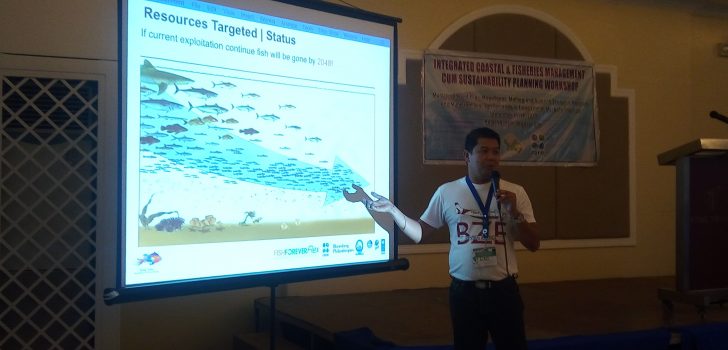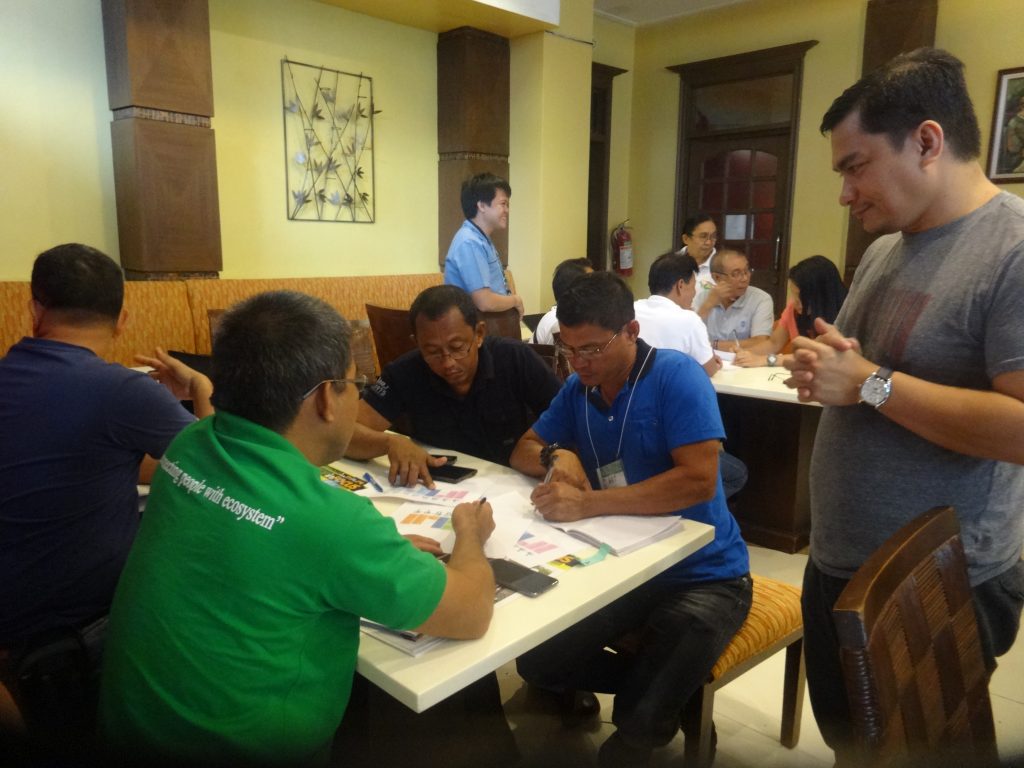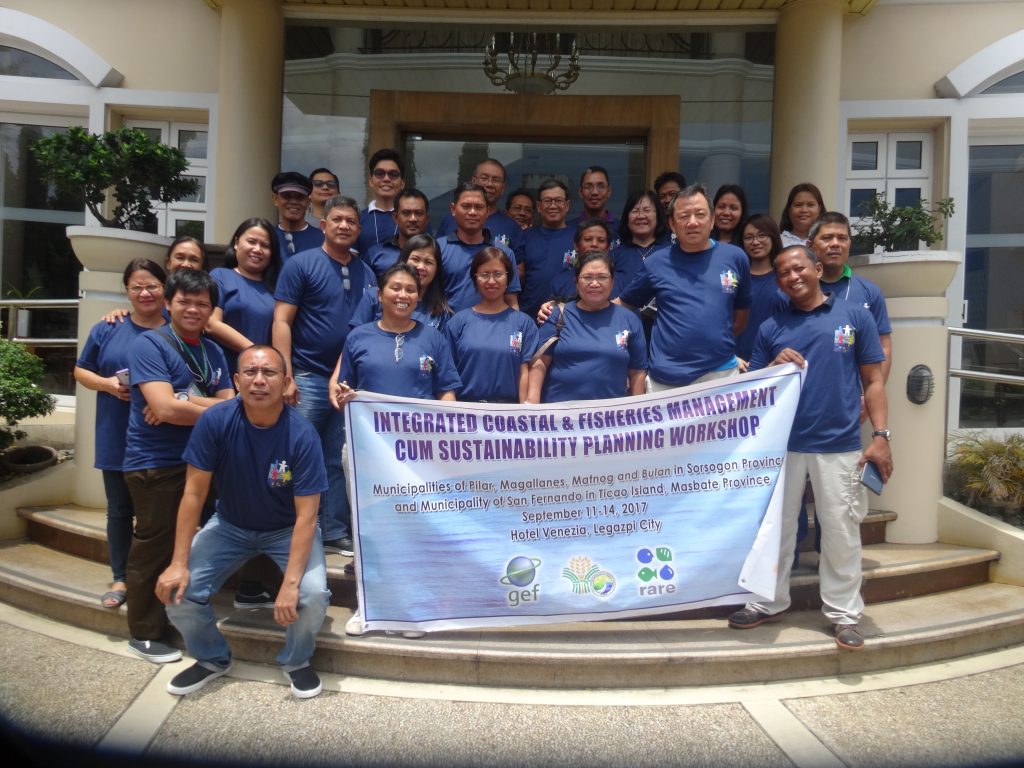 Rare Philippines Director for Technical Operations Roquelito Mancao shows the possible depletion of fishery resources if current exploitation continues. (Photo by Annielyn Baleza, DA-PRDP Bicol RPCO InfoACE Unit)
Rare Philippines Director for Technical Operations Roquelito Mancao shows the possible depletion of fishery resources if current exploitation continues. (Photo by Annielyn Baleza, DA-PRDP Bicol RPCO InfoACE Unit) Rare, Inc.: Go back to the people for sustainable coastal, fisheries management
In conservation, people are the cause and the solution.
According to Roquelito Mancao, Director for Technical Operations of Rare Philippines, the over-riding goal of coastal and fisheries management is the long-term sustainable use of the coastal and fisheries resources.
“If current exploitation continues, fish will be gone by 2048,” he warned. He mentioned that the country has a 36-kilogram per year per capita consumption of fish. About 61.6 million of the country’s 110 million population depend on fish for protein. This equates to 2.22 billion kilograms of fish that the country needs annually based on per capita consumption.
The Philippine Rural Development Project (PRDP) partnered with Rare, Inc., an international conservation organization to strengthen information and awareness activities as well as enhance integrated coastal management and policies in targeted PRDP-Global Environment Facility (GEF) sites.
Rare will conduct a series of workshops to assist targeted GEF sites in preparing Integrated Coastal and Fisheries Resource Management (ICFRM) and Sustainability Plan. The ICFRM will serve as the operational guideline of the local government unit (LGU) to strictly and effectively implement the coastal and fishery resource management program.
Mancao said that the ICFRM will also help the LGUs prioritize issues that need to be addressed and identify areas where they should concentrate their investments in terms of conservation, protection, and sustainable use of resources. In addition, it will show participatory and accountable governance, see where the investments go, track progress, and adjust what needs to be addressed in the plan.
“It’s high time for LGUs to use this plan in their development work and agenda and even as a reference for their Annual Investment Plan. With this plan, we hope that it will be institutionalized in the LGU level and sustained by investing financial and human resource, because sometimes it’s not enough to put budget without warm bodies doing it,” Mancao furthered.
He urged the LGUs to continue the data gathering on fisheries resources as more consolidated data will have an impact towards decisions on fisheries management.
Planners from the five targeted GEF sites in Bicol, namely, San Fernando in Masbate and Pilar, Bulan, Matnog, and Magallanes in Sorsogon were trained and oriented about the objectives and scope of the ICFRM and management programs. There were also discussions on plan implementation structures, making gender sensitive and climate change-compliant plans, social marketing, and creative marketing process during the activity held on September 11–14 in Legazpi City. This is during a Workshop on the Formulation of ICFRM Cum Sustainability Plan in the region as part of the partnership of PRDP and Rare Philippines.
Marietta Bayoca, Municipal Agriculturist of Bulan, Sorsogon, said that she used to dream of having a coastal resource management (CRM) plan for her municipality. In fact, she borrowed Bohol’s CRM plan and used it as a pattern. However, she struggled in preparing the said plan due to limited knowledge on the process.
“Ngayon, parang malinaw na sa akin ’yong mga steps kung paano gawin. Mas naintindihan ko ’yong mga terminologies pati paggawa ng posters at awareness campaigns. Na-appreciate ko siya. (Now, I gained better understanding of the steps and terminologies in CRM preparation including the process of doing posters and awareness campaigns. I appreciated it),” she said.
Noel Bergantin, Fisheries Coordinator of San Fernando, Masbate, said that preparing the ICFRM plan has been a very significant activity in protecting and conserving marine resources.
“Napakalaking tulong nito para maisatama ang pagpaplano patungkol sa pangisdaan. Ito ay napakahalagang practice para matugunan ang mga isyu at madagdagan ang kaalaman patungkol sa tamang sistema ng pangisdaan at para mas lalong mapalakas ang kaalaman hindi lang ng ating mga mangingisda kundi sa ahensya mismo ng ating pamahalaan (This is a big help in proper planning of our fisheries. It is a good opportunity to practice in order to address issues and increase knowledge on the right fishery management systems not only for the fisherfolk but for the government as well),” Bergantin added.

Rare Philippines Program Implementation Director Fel Caesar Cadiz assists the PRDP-GEF site planners from San Fernando, Masbate and Sorsogon in crafting their pitch by applying Rare’s Theory of Change. (Photo by Annielyn Baleza, DA-PRDP Bicol RPCO InfoACE Unit)
GEF-supported activities in PRDP include conservation implementation investments, coastal and marine ecosystem management implementation, and technical and operational capacities of stakeholders enhancement.
“In the heart of the philosophy of Rare is that people are the causes of the problems. Many of our environmental problems are anthropogenic, the solutions are also anthropogenic. Meaning, we are the problem and the source of the solution. I think that is very important when we create planning processes and steps to address the threats—we have to go back to the people. I think that’s something that we have started here and we’ll likely follow up in the succeeding workshops—how to really work with our fishers, our key influencers, our target audiences for them to change their behaviors if they are not doing things rightly and encourage others to work for the protection of the marine protected area, to conserve their fisheries management and defend their municipal waters,” Rare Philippines Program Implementation Director Fel Caesar Cadiz said.
Rare will facilitate a cluster-wide ICFRM Cum Sustainability Plan writeshop on November 20–24, 2017 as a follow-up activity. ### (Annielyn L. Baleza, DA-PRDP Bicol RPCO InfoACE Unit)

